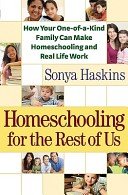 Homeschooling for the Rest of Us: How Your One-of-a-Kind Family Can Make Homeschooling and Real Life Work, by Sonya Haskins
(Bethany House, Minneapolis, 2010)
Homeschooling for the Rest of Us: How Your One-of-a-Kind Family Can Make Homeschooling and Real Life Work, by Sonya Haskins
(Bethany House, Minneapolis, 2010)
Sonya Haskins is a calm and reasonable voice speaking to the homeschooler—and potential homeschooler—who is overwhelmed and intimidated by the image of the "perfect" homeschooling experience: "Matching outfits, polite toddlers, award-winning students, fifteen-passenger vans, and family Web sites." (Raymond and Dorothy Moore did the same thing in the 1980s with Homeschool Burnout, which was updated and revised in the 1990s as The Successful Homeschool Family Handbook.) There's a lot of hype, confusion, and contradictory information out there, and Haskins' practical, back-to-basics approach and helpful suggestions will reassure timid beginners that they can, indeed, safely navigate the homeschooling waters.
It's a pity, then, that she "narrowcasts" her message to a small branch of Christian homeschoolers. Most of her suggestions are excellent and appropriate for anyone, but the evangelistic message and the assumptions of a young-earth Creationism are bound to make the general audience uneasy about the rest of the book. If its focus were broadened, this could become a classic introduction to homeschooling. But perhaps the author (or publisher) is not looking for "classic": the annoying sidebars and references to websites give it the feel of a magazine or "disposable book." As I said, a pity, because there's much good here.
A book of under 200 pages cannot hope to be both broad and detailed; Haskins elects for broad—one reason why it's good introductory material—but still manages to provide helpful lists and examples.
Rather than propounding one method of homeschooling, Homeschooling for the Rest of Us generally presents suggestions appropriate for many approaches. If she has an overarching philosophy, it is that character building is of primary importance.
Several years ago a mom came to me and asked how she should start homeschooling her children, then ages six and four. I suggested three things: reading to them frequently, training them to obey, and spending the first year or two focusing on relationships. In my opinion, it is that third step that isn't emphasized enough in homeschool households. We forget how important it is to teach our children how to get along, respect one another, and love others. Parents have plenty of time to introduce academics, field trips, and outside activities, but if children don't learn how to develop positive relationships while they are young, it is difficult for them to attain this ability later.
I meet parents all the time who are so proud that their two-year-old can recite the alphabet, but when the parent tells the child not to do something, she does it anyway. You can teach an obedient child new things, but it is very difficult to teach a disobedient child anything!
She is quite right, and I always say that the most important factor in determining the potential success of a homeschool situation is how well the parent and child get along. Emphasizing academic excellence while allowing character to slide is setting a child up for ultimate failure. Unfortunately, Haskins swings the pendulum too far the other way. Her lackadaisical approach to academics is likely to be taken by those who are already too lax academically as an excuse to do even less. Young children can learn obedience and the alphabet as well.
A basic belief among Christian homeschoolers is that the education of children is at heart a parental responsibility, not a governmental responsibility. Homeschooling for the Rest of Us goes an important step further, making the critical point that, ultimately, education is the responsibility of the student. (Unschoolers and secular writers such as John Holt and John Taylor Gatto would agree.)
Before the mid-1800s, the burden of education was not on the government. Nor was it on the parents.... Students knew that the burden of education was on their shoulders. If they wanted to learn something, they borrowed books or found someone who could teach them what they wanted to know. Education was considered a privilege.
When your child takes control of his or her education, this doesn't mean you throw discipline, structure, and guidance out the window. It simply means that you allow your child to be the one responsible for his education.... You may choose to continue with a schedule.... You might even choose to have a structured curriculum. But do not waste time every day arguing with a child about doing his schoolwork.
Here are a few more of my favorite quotes:
Over the years, I've discovered that the problem usually is not that [naysayers] disagree with the concept of homeschooling, but they think you disapprove of their choice to send their child to public or private school. Each of you surely loves your child, and opinions differ on many parenting issues, including discipline, eating habits, and clothing choices. But strangely, while friends can politely disagree on many things, it's often education choices that cause relationship problems.
[W]e parents should treat our children fairly, but there is a huge difference between fair and equal.
If you're still feeling pressure because experts or others tell you to "do it this way" or "if you'd only follow my plan, your life will be perfect, your children will obey, and they will love learning" or any other "just do it my way" kinds of statements, my advice is simple: Find different experts!
I'm not convinced that Homeschooling for the Rest of Us is a book worth buying, though at $10 it's hard to complain much. In any case, if you're new to homeschooling, frustrated in your own homeschooling efforts, or merely curious, and if you can appreciate—or at least ignore—the narrowness of its theological focus, it's a book well worth reading. But please don't let her minimalist approach to academics deprive your children of the educational excellence they can and should achieve.


